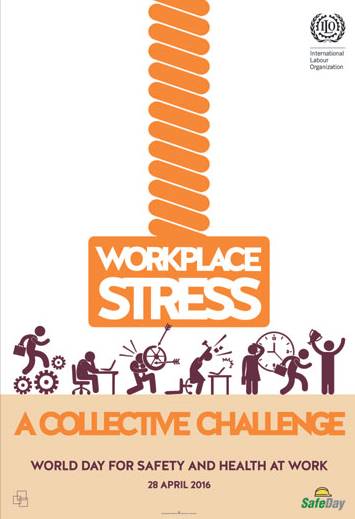Mobile : +91 94864 86768
E-mail : rk@3iqualityconsultants.com
Previous Articles
World Day for Safety and Health at Work
Published on 28-04-16
The World Day for Safety and Health at Work is an annual international campaign to promote safe, healthy and decent work. It is held on 28 April and has been observed by the International Labour Organization (ILO) since 2003.
28 April has also long been associated with the world’s trade union movement’s commemoration of the victims of occupational accidents and diseases.
Every year some two million men and women lose their lives through accidents and diseases linked to their work. In addition, there are 270 million occupational accidents and 160 million occupational diseases each year, incurring US$ 2.8 trillion in costs for lost working time and expenses for treatment, compensation and rehabilitation. Fatalities, accidents and illness at work are highly preventable and we have an obligation to act.
A national occupational safety and health culture is one in which the right to a safe and healthy working environment is respected at all levels, where governments, employers and workers actively participate in securing a safe and healthy working environment through a system of defined rights, responsibilities and duties, and where the highest priority is accorded to the principle of prevention.
Every year there is a theme identified for this campaign. The theme for 2015 was “Join in building a culture of prevention on OSH”, where the focus was on involvement of people at all levels resulting into prevention of Occupational Health and Safety Hazards.
The theme for 2016 is
“Workplace Stress: a collective challenge”.

In today’s scenario, many workers are facing greater pressure to meet the demands of modern working life. Psychosocial risks such as increased competition, higher expectations on performance and longer working hours are contributing to the workplace becoming an ever more stressful environment. With the pace of work dictated by instant communications and high levels of global competition, the lines separating work from life are becoming more and more difficult to identify. In addition, due to the significant changes in labour relations and the current economic recession, workers are experiencing organizational changes and restructuring, reduced work opportunities, increasing precarious work, the fear of losing their jobs, massive layoffs and unemployment and decreased financial stability, with serious consequences to their mental health and well-being.
In recent years, there has been growing attention to the impact of psychosocial risks and work-related stress among researchers, practitioners and policymakers. Work-related stress is now generally acknowledged as global issue affecting all countries, all professions and all workers both in developed and developing countries. In this complex context, the workplace is at the same time an important source of psychosocial risks and the ideal venue to address them in order to protect the health and well-being of workers.
Please find attached a brief presentation on ‘Workplace Stress: A Collective Challenge’.
Some of the measures that can reduce the toll of workplace stress on the societies and businesses are as below:
- Continued focus: Awareness on these issues is growing. In most countries policymakers and social partners have become involved in concrete interventions to tackle psychosocial hazards, which are the causes of work-related stress. Social partners have been active, awareness raising campaigns have proliferated and many research networks and professional associations have become involved.
- Prevention: The protection of mental health at work has more impact if it focuses on preventive strategies. It is essential to handle the causes and the consequences of work-related stress with a combination of both collective and individual measures.
- Inclusion: Greater opportunities for participating in decision-making are associated with greater satisfaction and a higher feeling of self-esteem. In the long-term, even small amounts of autonomy in the execution of tasks are beneficial for the mental health and productivity of workers. Participation in decision-making in the workplace moderates the effects of psychosocial hazards such as job demands and leads to reduced psychological strain.
- Management: A comprehensive OSH management system would ensure improved preventive practices and incorporation of health promotion measures. This should include psychosocial risks in risk assessment and management measures with a view to effectively managing their impact in the same way as with other OSH risks in the workplace. Workers’ participation in this process is crucial.
- Organizational Culture: ILO experience shows the importance of the social environment in shaping work behaviour and valuing them; human resource policies play a role in ensuring working relationships based on trust, authenticity and partnership.
Let us all take efforts to initiate actions
to reduce Workplace Stress, thereby contribute to
the well-being of the company, society and the country.
Courtesy: www.ilo.orgPublished on 28-04-2016
Previous Articles
- National Road Safety Week
- Automotive Industry Gets a New Evolution in Quality Management
- World Day for Safety and Health at Work
- Hazardous Wastes Management Rules, 2016
- E- Waste Management Rules, 2016
- Plastic Waste Management Rules, 2016
- Update on ISO 45001 status
- Oil & Gas Conservation Fortnight 2016
- National Road Safety Week
- Update on ISO 13485 revision
- Update on ISO 45001 status
- Awareness on Climate Change
- The Factories Act, 2015 draft
- World Quality Day 2015
- ISO Survey 2014
- Revision of ISO Standards
- Joseph Moses Juran
- W. Edwards Deming



 Services Offered
Services Offered